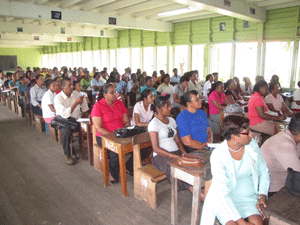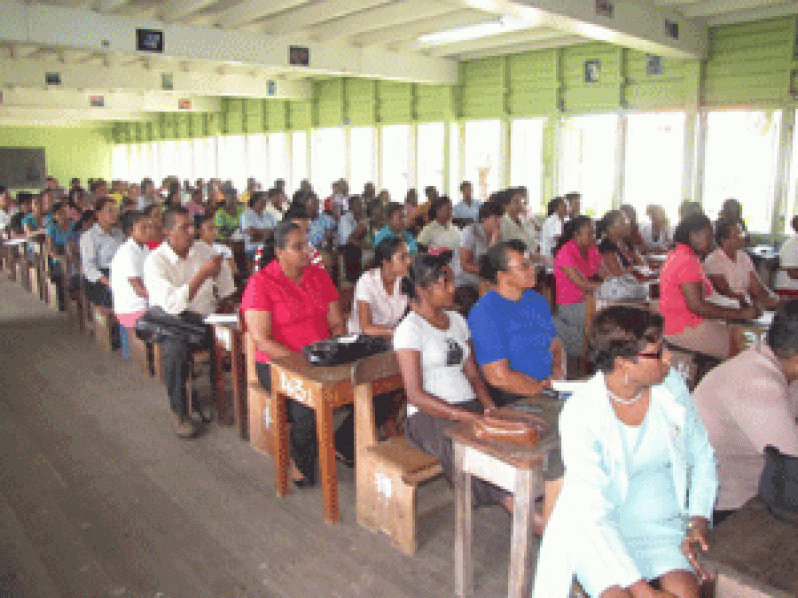HUNDREDS of teachers and parents of Region 2 on Friday were afforded the opportunity by the Education Ministry to deliver their inputs to the national consultation on corporal punishment in schools and the non-repetition and automatic promotion policy.  The consultation was conducted by a team of officials from the ministry lead by Technical advisor/Head of School board Melcita Bovell at the Cotton Field Secondary School.
The consultation was conducted by a team of officials from the ministry lead by Technical advisor/Head of School board Melcita Bovell at the Cotton Field Secondary School.
The session was part of a countrywide process to garner inputs from society and stakeholders on various policies and programmes within the education system. Prior to hearing stakeholders’ contributions, Bovell made two lengthy presentations to the gathering detailing the advantages and disadvantages of corporal punishment in schools and non-repetition and the automatic promotion policy.
She said that the policy of non-repetition and automatic promotion was arrived at after extensive research, debate and consultation. However, the ministry ultimately adopted the position that automatic promotion is a better strategy than school-imposed repetition.
“This policy was implemented two years ago and as such we are going around the country consulting with parents and teachers to see whether the programmes have been working and if they want it to continue, be reviewed or to be discontinued,” Bovell explained.
Corporal punishment
Corporal Punishment, she said according to the United Nations Children’s Fund is the use of physical force causing physical pain, but not wounds as a means of discipline.
“The time has come for Guyana to make a decision and therefore the Ministry of Education has been consulting with teachers and parents across the country to have their inputs[on] corporal punishment on whether it should be banned or allowed in the school system,” Bovell said.
While elaborating on the definition of corporal punishment, she said it involves smacking, slapping and spanking students by use of hand or an implement such as a whip, stick, belt and shoes. It also involves forcing children to stay in uncomfortable positions or any punishment which belittles, humiliates, denigrates, threatens, scares or ridicules the child.
She also used the opportunity to outline the history of corporal punishment and spoke of the actions of many governmental and non-governmental organisations across the globe that either supported or called for the abolition of corporal punishment in schools.
The official also explained the advantages and disadvantages of corporal punishment and stakeholders were exposed to presentations on the same.
While Guyana, she reiterated, is yet to make its decision on the issue, she reminded teachers and heads of schools to consult with the ministry’s manual on guidelines for the Maintenance of Order and Discipline before administering corporal punishment to students.



.jpg)








